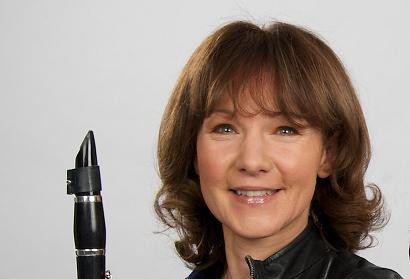Abergavenny Borough Theatre, September 11, 2015
Emma Johnson (clarinet), John Lenehan (piano)
Brahms: Clarinet Sonata in E flat, Op.120 No.2
Weber: Grand Duo Concertant, Op. 48
Jonathan Dove: The Pied Piper
Mozart: Larghetto, from Clarinet Quintet in A
Alec Templeton: Bach Goes To Town
Bernstein: Riffs, from Prelude, Fugue and Riffs
On the grounds of cultural need, it would be uncharitable to take issue with Emma Johnson for including Alec Templeton’s most popular work in a recital given in Wales, and largely made up of staples from the clarinet repertory. Cardiff-born Templeton decamped to America, where Bach Goes To Town, a piece of mildly subversive frippery, won fame among music-lovers who both wear hearts on sleeves and are serious about the European music tradition.
For Templeton’s jazzy number sums up both states of mind in a way that, say, Jacques Loussier’s deadpan fusions of jazz and J. S. Bach never could. But for a Welshman it’s a bagatelle and we know Wales can do better, even if it means transcribing for the clarinet music not written for it specifically. It was part of a lighter selection after the interval, when Johnson and Lenehan despatched, among others, the third part of Bernstein’s Prelude, Fugue and Riffs for concert jazz orchestra – another transposition, this time downwards and drastic. (Who are these transcribers when they are not the composers themselves? Musicians with relatively limited solo opportunities are constantly indebted to them.)
The second half was thus interesting for its opportunities to blow frenetically on some eccentric lines, not least in Jonathan Dove’s The Pied Piper, a semi-theatrical commission requiring the soloist to recite the poem as well as interpolate onomatopoeic bursts on the clarinet. When first performed with Lenehan in Southampton, the two were joined by children, who added to the sound effects on recorders – and, one assumes, eventually followed the leader in some way. The version heard here, sans youngsters, saw Johnson wander into the wings and return in a piper’s pied coat.
Amid such departures from the repertorial norm, Mozart’s larghetto from the Clarinet Quintet in A seemed out of place but Johnson made its long-breathed line translucent. Such ease of delivery coupled with a sublime lyrical sense and – for this reviewer anyway – a sharpness and penetration that seem to have arrived with some kind of late maturing, makes Johnson a better and more impressive all-rounder than she’s ever been. It was evident in the Bernstein piece, another reduction, in which Lenehan’s keyboard part, though complex and breathtaking, needed to be over-ridden, as indeed it was. Maybe Johnson took Bernstein too much at his word when he said Riffs was to be played to exhaustion, for the showy variations in her first encore, Jeanjean’s Carnival of Venice, tested her to the limit. So much so, that her second, the limpid music written by Paul Reade for BBC TV’s The Victorian Kitchen Garden and dedicated to her, must have been welcome respite.
All these qualities, both essential and lately flowered, were evident in the Brahms Sonata No. 2 in E Flat and the Weber Grand Duo Concertant, especially the latter with its near-equivalence of clarinet and piano parts; though such is Johnson’s commanding presence that Lenehan was forced to over-exert himself on an instrument with some dodgy sonics somewhere around the octave above middle C. Maybe the pianist’s galvanising qualities, which did so much to make the couple’s recording of the Brahms and Mendelssohn sonatas so memorable, have contributed to Johnson’s sturdier platform presence. Yet it was her relaxation in the Brahms on this occasion, with its lack of Jeanjean-type ostentation and its leaning towards song lodged among nourishing textures, that helped usher in the autumnal. The substitution of a slow movement by a scherzo with a central trio section marked ma dolce e ben cantando had Johnson responding sweetly and seasonally.
The pair certainly emphasised the grand in Grand Concertant, having some fun with its moments of apparent pomposity and the composer’s way of not allowing the clarinet to push its luck as primus inter pares. Weber the accomplished pianist is reflected in the vigour and counterplay as much as the work’s dedicatee, Heinrich Bärmann, who of course was to Weber as Stadler was to Mozart and Mühlfeld to Brahms. The unified Johnson-Lenehan partnership clearly finds this work felicitous, evident when the clarinet is given its head in the serene moments of the first two movements and is then forced to recognise the piano’s wilful and congruent presence.
Header photo credit: John Batten



 Enjoyed this article? Support our writers directly by buying them a coffee and clicking this link.
Enjoyed this article? Support our writers directly by buying them a coffee and clicking this link.







